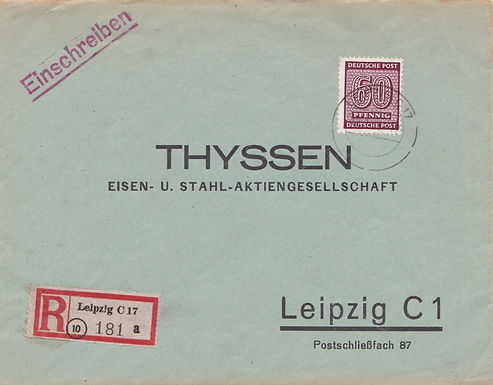12th January 1946
Thyssen AG



Cover sent to the Thyssen steel company form an ophthalmologist (both in Leipzig - note the postmarked time as '12' and the received date stamp as '18' on the 12th January). Ref: 12.01.1946
Thyssen AG
Thyssen was a major German steel producer founded by August Thyssen. The company merged with Friedrich Krupp AG Hoesch-Krupp to form ThyssenKrupp in 1999.
On 29th September 1891, August Thyssen and his brother Joseph Thyssen came to be in possession of all shares of Gewerkschaft Deutscher Kaiser, a coal mining company. On 17th December 1891, the steelworks of the same company opened in Hamborn (today part of Duisburg).
The Nazi rearmament policy and subsequent war made the plants essential to the war economy. After the end of World War II, the Allies ordered the company to be liquidated and in 1953 a new company, also named August Thyssen-Hütte AG, was formed in Duisburg. The other mills of the company in Duisburg became legally independent entities; in the 1950s and 1960s they were reintegrated into the Thyssen group. However, the mining division was not reconglomerated; thus Thyssen became largely a steel company.
'Fritz' Thyssen
Friedrich 'Fritz' Thyssen (1873 - 1951) was a German businessman, born into one of Germany's leading industrial families. He was an early supporter of the Nazi Party but later broke with it.
Thyssen welcomed the Nazi suppression of leftist organisations such as the Communist Party, the Social Democratic Party, and trade unions. In 1934, he was one of the business leaders who persuaded Hitler to suppress the SA, leading to the 'Night of the Long Knives'.
Thyssen became a member of Hans Frank's Academy for German Law. He accepted the anti-Jewish legislation in pre-war Nazi Germany that excluded Jews from business and professional life, and dismissed his Jewish employees. But as a Catholic, he objected to the increasing Nazi persecution of the Catholic Church in Germany, which gathered pace after 1935: in 1937 he sent a letter to Hitler, protesting at the persecution of Christians in Germany. The breaking point for Thyssen was the violent pogrom against the Jews in November 1938, known as Kristallnacht, which caused him to resign from the Prussian Council of State. By 1939 he was also bitterly criticising Nazi economic policies, which focused on rearmament in preparation for war.
On 1st September 1939, the invasion of Poland marked the commencement of World War II. Thyssen sent Hermann Göring a telegram saying he was opposed to the war, shortly after arriving in Switzerland with his family. He was expelled from the Nazi Party and the Reichstag, and his company was nationalised. The company was returned to other members of the Thyssen family several years after the war.
In 1940, Thyssen took refuge and moved to France, intending to emigrate to Argentina, but was caught up in the German invasion of France and the Low Countries while he was visiting his ill mother in Belgium. He was arrested by Vichy France and sent back to Germany, where he was confined, first in a sanatorium near Berlin, then from 1943 in Sachsenhausen concentration camp. His wife Amelie did not escape to Argentina and spent the whole war in the concentration camp with her husband.
In February 1945, Thyssen was sent to Dachau concentration camp. He was comparatively well-treated and transferred to Tyrol in late-April 1945 together with other prominent inmates, where the SS left the prisoners behind. He was liberated by the 42nd Infantry Division and 45th Infantry Division on 5th May 1945.
While Thyssen was imprisoned in Germany, a memoirs was published in the United States in 1941 under the title I Paid Hitler. The book was ghostwritten by the journalist Emery Reves, the memoirs are seen as unreliable by historians.
Thyssen was tried for being a supporter of the Nazi Party. He did not deny that he had been a Nazi supporter until 1938, and he accepted responsibility for his companies' mistreatment of Jewish employees in the 1930s, although he denied involvement in the employment of slave labour during the war.
On 2nd October 1948, a denazification tribunal declared Thyssen a lesser offender and sentenced him to a fine of 15% of his assets. Thyssen agreed to pay 500,000 Deutschmarks (equivalent to €1,652,535 in 2021) as compensation to those who suffered as a result of his actions, and was acquitted of other charges.
In January 1950, he and his wife emigrated to Buenos Aires, where he died the following year. Thyssen was buried in the family mausoleum in Mülheim.
Source: Wikipedia
Contact Brief History to inform us of additional information regarding this page